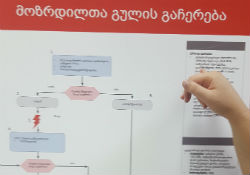Strengthening the quality of primary health care for the people of Georgia

WHO/A.Satylganova
Georgia has made important strides with its new Primary Health Care Development Strategy 2016–2023, which was developed within the context of the 2014–2020 State Concept of Healthcare System of Georgia for Universal Health Care and Quality Control for the Protection of Patients’ Rights. Such initiatives in primary health care are important in placing people at the centre of public interventions and in driving an upstream response to the increasing burden of noncommunicable diseases in Georgia. At present, noncommunicable diseases alone account for an estimated 93% of total deaths in Georgia, of which 69% are related to cardiovascular diseases. From 2005 to 2015, the types of noncommunicable diseases with the greatest increases as causes of deaths were hypertensive heart disease (146% increase) and diabetes (66% increase).
The WHO European Centre for Primary Health Care conducted a recent review at the request of the Ministry of Labour, Health and Social Affairs, reporting that enhancing existing mechanisms to assure a continuum of quality across system inputs, services processes, outputs and health outcomes will be important in making meaningful improvements in clinical practice and in defining accountability lines along defined care pathways.
The review proposes piloting a disease management programme to shape new scopes of practice for primary care practitioners and gradually aligning system incentives to support a clear role for primary health care while also accelerating the fight against noncommunicable diseases. This type of services organization requires implementing continuous learning loops to maintain professional competencies that are aligned with national clinical guidelines for primary health care and helping to form new patient care pathways defined further by clear accountability and financial arrangements.
The 2014–2020 State Concept of Healthcare System of Georgia for Universal Health Care and Quality Control for the Protection of Patients’ Rights has focused attention on transforming services delivery. The Concept presents an opportunity for aligning and consolidating vertical efforts into a horizontally integrated platform of high-quality services. A model of care based on strengthening primary health care can facilitate this and improve the quality of services, achieving universal health coverage while ensuring sustainability in the long term.
Georgia endorsed the European Framework for Action on Integrated Health Services Delivery in 2016 at the 66th session of the WHO Regional Committee for Europe in Copenhagen, Denmark.



